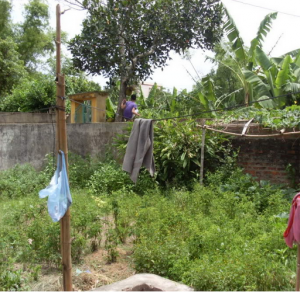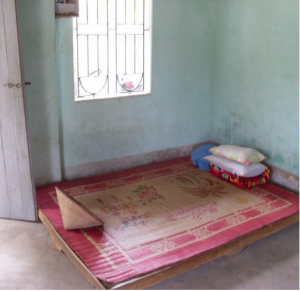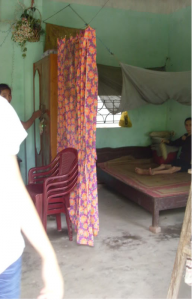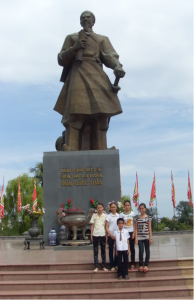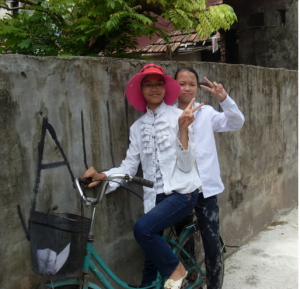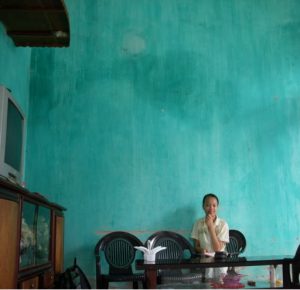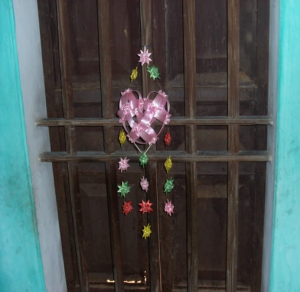When I woke up at 5 in the morning with Hang, the mother had already been to the market and prepared the breakfast. The whole village was up early, because we wanted to say goodbye to the emigrants. A few uncles arrived for breakfast for a visit, so there was something very special, jellyfish and squid. I nibbled on my dry sticky rice, said goodbye to the hillside and the family and followed the men who helped the emigrant family in a large caravan on motorcycles to carry the household to the train station. I should follow them on the bike of Bo’s father, and was then said goodbye to at Bo’s house. There I was greeted by Bo, who tried again to talk me out of to visit the girls from the second home, but to stay one more day with him. I insisted, however, and assured that I could take a taxi if necessary, but then Bo’s father interfered and gave assurances that he would drive. He took me to the bus station in the provincial capital, from where I called Ly and Hong from the second home that we could meet there. The girls told me that they would pick me up and now I expected that they would ask an uncle to pick me up with the motorcycle, such as it is so common in Vietnam. So I waited, and waited. It took a bloody long time, and when the girls finally arrived, I knew why: They had come by bicycle. I learned that of all their relatives nobody had a motorcycle, and that’s in Vietnam really a sign of great poverty, because the bike is the thing that one wants to buy first. The sister of Ly and the cousin of Hong had also come along, my visit was for them a great event. When I pedaled back with Hong on the carrier I was aware of what a challenge it is for the children if they want a ride to the city center. I mean, something like bike paths do not exist in Vietnam anyway, but even the traffic on this road was full of huge load trucks that carelessly drove not only a breakneck speed but their exhaust even goes completely unfiltered in the faces of the children. Hong nodded on a factory site on the roadside: “My mother works there. She has to get up at 4 every morning so they make it on time to work by bike..” The father of Hong had died 3 years ago and since then the mother of 4 children is the single-carer (or 3, since Hong now can live in the second home). What working conditions await her in the factory, I do not want to imagine. Factory in Vietnam means sweatshop. Assembly line sewing machine or work in the Chinese style, mostly under the sound of thunderous noise, standing heat or unfiltered chemicals. The story of Ly goes parallel, she lives next door. Hong climbs over the wall between her house and Lys We arrived in her village on the outskirts, and the children began at once to cook. They were alone at home during the day because the mothers were working in the factory. Hong had not only to cook for her little brother but also for her two grandmothers and the latter were also to be fed. It was the two mothers of her late father. One was the woman who the grandfather had married for love, the second the one with whom he had had children, because the first was barren. I read that a little earlier it was quite common in Vietnam. If your wife could not have children, they were taking a second wife, and both women had come to terms with each other somehow. The childless Grandma sat apathetic on the bed and did not respond when I greeted her. She was blind and hard of hearing, explained Hong. When the food was ready, Hong sister arrived by bicycle from work. She looked young and pretty and seemingly embarrassed that I saw her in her sweaty work clothes and went to change clothes quickly. I asked Hong, where her sister was working. In the factory. “And anyway, how old is your sister again?” “Seventeen.” I had to swallow vigorously and remember what I had with 17 so little problems. Would I had managed to push a layer in the factory and then have to take care of my younger siblings and disabled grandmas? Hong’s sister came back, sat down to eat and asked Hong on whether she had done all her household chores. I ate my rice and thought quite guiltily that I had invested all my energy in the last three days to take a vacation. We finished Hong sister washed the dishes. While the others slept, my afternoon nap did not succeed so well, because the power had went out and I had to stay awake to fan myself with one hand. How could anyone survive the summer in this country, before the invention of the fan? The bed Hong shares with her siblings. The blind grandma in her bed. After the nap, the girls wanted to organize things for me, they were convinced that I would find it boring to be with them at home. All bikes were gathered and then all the children started cycling, always one with someone back on the luggage rack. We biked an eternity to a lake in the city center, I was totally exhausted and suggested that we parked our bikes and could drink a bit coconutwater lakefront. I reaped uncomfortable silence for my proposal. I was completely confused because I could not understand why they were not enthusiastic in this heat after this effort of something to drink. “Are you not thirsty?” I asked the children. They suppressed all her gasp and silence continued until at Hong’s little brother answered bluntly yes and was then pushed by his big sister with her elbow. Only now I understood. Of course, they were thirsty, every one of them. But they had no money, they had never had enough money to go for a drink in town. And they would rather suppress their thirst than to expect me to pay them a drink. I had to think of Bo, who comes from a wealthy family, and for whom I had to pay his bus ticket, without him saying thank you. Because I am a European. I am rich, the people know, even if they know so little else about the world. These thoughts made me angry, it angered me that those are with the best character who shall inherit the worst, or, conversely, that those who live under the harshest conditions thereby get the best character. Annoyed, I asked the children: “Let’s now park our bikes here and then we drink somethiong. You can not jeopardize your health by cycling here in the heat without drinking anything!” I had to think of the recommendation of the German Society for Nutrition to drink 2 liters every day and imagined what a Vietnamese mother in the countryside would respond to it: Give us clean drinking water! We parked the bikes, I paid the parking fee of 7ct per bike and ordered each a lemon ice tea, and a large coconut with it. “A coconut? You can order a whole coconut ?!” Ly asked totally confused. Coconuts are sold in the tourist area in Hanoi on every street corner for drinking. Each foreign volunteers in Vietnam drinks in a few months more than a dozen of them, then returns to his country and says that you can drink coconut in Vietnam all day. Ly lived 14 years in Vietnam and has never had one. We drink and ride back, drive past the magnificent Palace of Government of the province, and at the richly decorated statue of a local war hero. I wonder how big an amountof of taxpayers’ money had been put in these buildings, and how much of this money could be given to the poor families in the immediate vicinity. Group photo in front of the hero statue Best Sunday clothes for the trip The children quickly cook the evening rice and wait for their mothers who come from the factory. They welcomed me warmly and ask if I stay overnight. But I have to be in Hanoi early and therefore leave tonight. Of course, there is no plan, no Internet, no telephone with which you could find out when the last bus went, so we cycle on by good luck with the sunset to the bus station. Along the way Hong once indicated aside and murmurs: “My father lives there”. I need to register for a while, what she said, and then look confused back to what we have just gone past. It was a cemetery. When we arrive at the bus station, it’s dark. A single vehicle stands still and waits for passengers. I send the girls back quickly and I feel quite uncomfortable, that they now have to go through the dark because of me. I’m thinking about what I’ve learned everything on this trip. About poverty and wealth. Distrust and shame. Self-determination and group decisions. Plans and reality. I breathe in the cooling evening air before I get on the bus and a descent into hell begins, which would be just as memorable as this whole trip. Ly’s little sister in their home Handicrafts by Ly Lauras Blog: Vietnam und Ich
